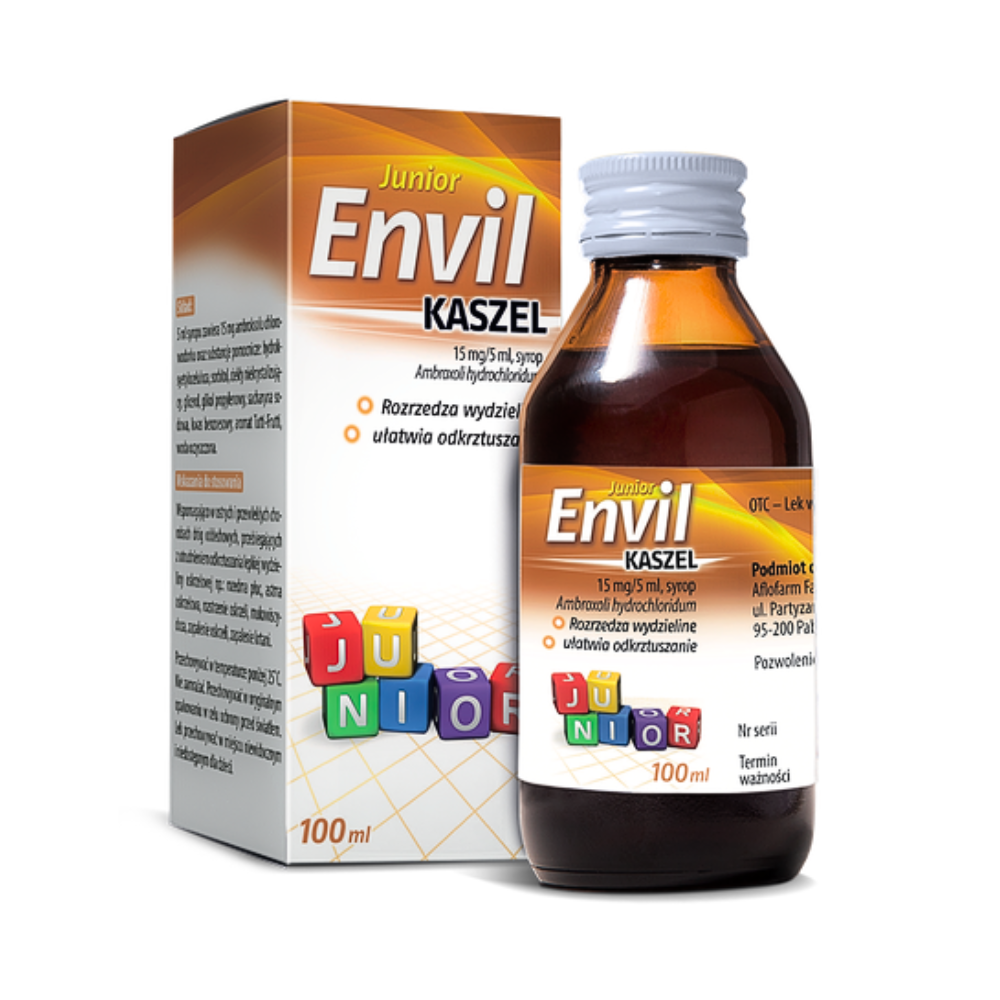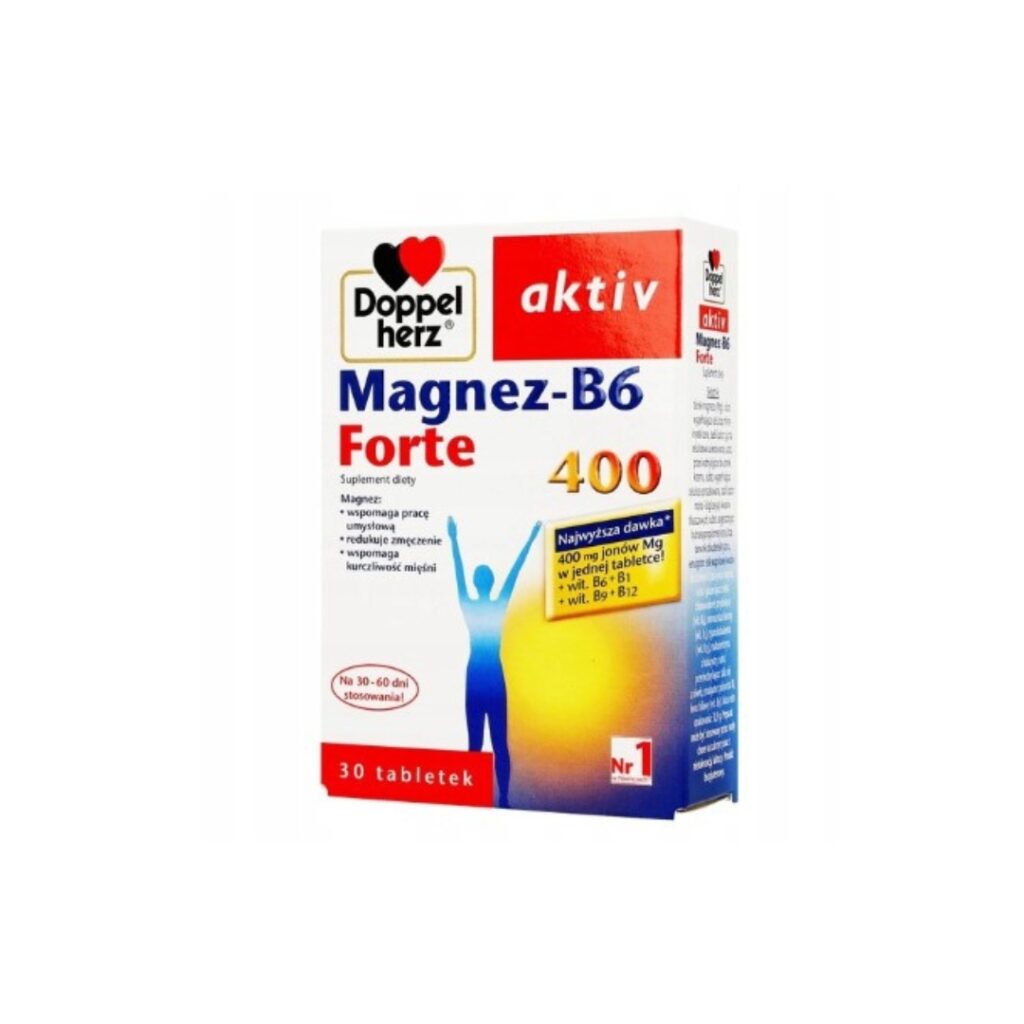Envil Cough Junior Syrup 100ml
Envil Cough Junior Syrup contains the active substance ambroxol hydrochloride, which has an expectorant and thinning secretion in the respiratory tract. Envil cough syrup is a syrup for oral use.
Symptoms
Envil Cough Junior Syrup is used:
- As an auxiliary in acute and chronic diseases of the respiratory tract with difficulty coughing up viscous bronchial secretions, such as emphysema, bronchial asthma, bronchiectasis, cystic fibrosis, bronchitis, laryngitis. If you do not feel better or feel worse after 4 to 5 days, please contact your doctor.
Active substance: Ambroxoli hydrochloride
Composition of Envil Cough Junior Syrup
5ml of syrup contains 15 mg of ambroxol hydrochloride (Ambroxoli hydrochloridum). For excipients, see section 6.1.
Dosage of Envil Cough Junior Syrup
Product for oral use. The package comes with a measuring cup that allows you to measure 2.5ml or 5ml of syrup.
- Children up to 2 years of age – 7.5 mg (2.5 ml of syrup) twice a day,
- Children aged 3 to 5 years – 7.5 mg (2.5 ml of syrup) three times a day,
- Children aged 6 to 12 years – 15 mg (5 ml of syrup) two to three times a day.
Administration method:
The recommended doses are administered after the morning and afternoon meals.
Do not use before bedtime.
The given doses are used in the treatment of acute conditions and in the initial period of treatment of
chronic conditions, in long-term treatment (over 14 days) they can be reduced to half.
The syrup can be used by people with diabetes.
Contraindications
Do not use if you have hypersensitivity to ambroxol hydrochloride or other ingredients of the medicinal product.
Contents
Envil cough junior is in the form of a syrup. The packaging of the drug is an amber glass bottle with 100 ml of syrup, closed with an aluminum cap with a measuring cup, in a cardboard box.
Storage method
Below 25°C
Manufacturer
Warnings
This is medicine. For safety, use it according to the leaflet attached to the package. Do not exceed the maximum dose of the drug. If in doubt, consult your doctor or pharmacist.
Use with caution in patients with gastric or duodenal ulcer disease, with liver failure. Ambroxol should be used with caution in patients with a weakened cough reflex or bronchial ciliary clearance disorders due to the possibility of secretion retention.
The medicinal product contains sorbitol, therefore it should not be used in patients with rare hereditary fructose intolerance.
The medicinal product contains benzoic acid and propylene glycol, which may cause allergic reactions in people with hypersensitivity .
Fluid bronchial secretions may appear in excess at the beginning of treatment. In this case, a cough should be provoked in order to expectorate the thinned secretion or the secretion should be suctioned off.
In patients with renal insufficiency, the recommended dose should be reduced.
Ambroxol used as an adjuvant in patients with bronchial asthma may initially increase cough and cause excessive expectoration.
Very rare cases of severe skin lesions have been reported after the use of ambroxol.
Pregnancy and breastfeeding
The medicinal product should only be used during pregnancy if clearly needed.
There are insufficient data on the use of ambroxol during breast-feeding.
Ambroxol passes into breast milk.
Use the drug with caution during breastfeeding.
Driving
The medicinal product does not impair psychophysical fitness, the ability to drive motor vehicles and operate mechanical devices.
Overdosage
To date, symptoms of overdose in humans using therapeutic doses have not been described.
However, if you experience nausea, fatigue, excessive mucus secretion, treatment should be given symptomatic.
Interactions with other drugs
Orally administered ambroxol concomitantly with antibiotics (amoxicillin, erythromycin, ampicillin, doxycycline and cefuroxime) increases their penetration into the lungs and increases their action.
Ambroxol and theophylline mutually intensify each other’s action.
Ambroxol should not be used simultaneously with antitussives, as they may inhibit the cough reflex and cause secretions to remain in the respiratory tract.
Side effects
Gastrointestinal disorders: heartburn, indigestion, nausea, vomiting, diarrhea and constipation.
Immune system disorders: allergic reactions (skin lesions, hives, angioedema, anaphylactic shock, fever, shortness of breath, chills, swelling of the face, headache), xerostomia (dry mouth).
Renal and urinary disorders: rarely may occur: dysuria (difficulty urinating).




